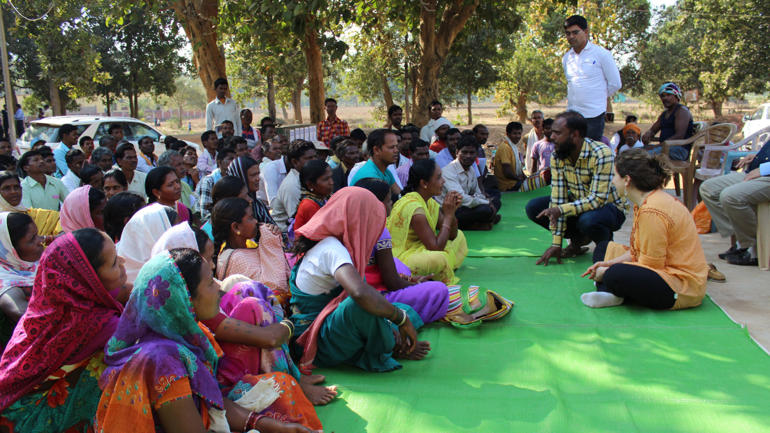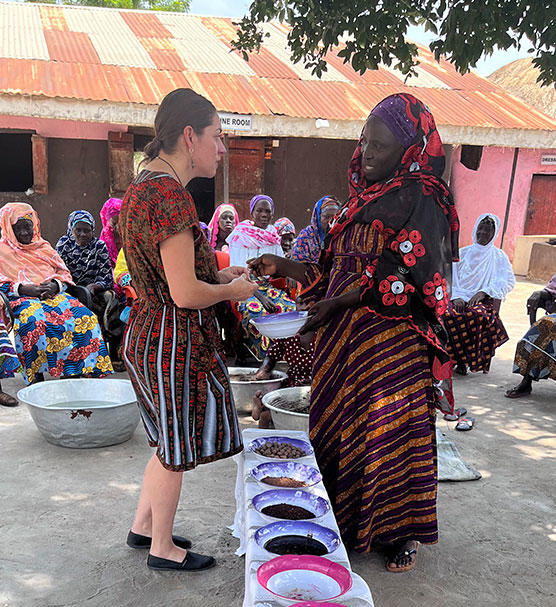This is one of a series of case studies developed by WBCSD and the Just Rural Transition to examine how large agribusinesses empower and engage SME suppliers and stakeholders to reach their sustainability goals. These examine the business case for supplier empowerment; what good policy looks like; and challenges and solutions involved in engaging suppliers. The cases identify best practices around how procurement can support a company’s sustainability priorities and performance. Click here for a synthesis that identifies key themes and recommended action from the series of case studies.
Background and business case context
Mission-based company developing close supplier relationships
The Body Shop is a UK-based cosmetics and associated products brand, with a stated purpose of making business be a force for good. The company was founded in the 1970s by environmental and social campaigner and business woman Anita Roddick. It is currently owned by Brazilian cosmetics company Natura since 2017.
The business sources its Community Fair Trade ingredients, gifts and accessory products primarily from SME suppliers, and prides itself on developing close relationships with all participants in its supply chain.
Solution: Community Fair Trade
Since 1987, The Body Shop has developed its Community Fair Trade program that sources ingredients, gifts and accessory products from producers based around the world. The program is designed to drive positive social and environmental changes in the communities where the company’s suppliers live and work. Community Fair Trade is independently verified and assured by the fair trade assessors Ecocert.
Independence and empowerment
Community Fair Trade, originally termed as Trade not Aid, is a bespoke fair trade programme that enables suppliers to gain market access, and investments in social and environmental projects for community benefit. Supplier communities benefit from financial independence, and Community Fair Trade has a particular focus on empowering women.
Community Fair Trade is based on three pillars: firstly that it is a social-based program that aims to allow The Body Shop to buy ingredients, gifts and accessory and products in the best way possible; secondly, it encourages good environmental practices, increasingly looking at regenerative practices; and, thirdly, it encapsulates The Body Shop’s culture of activism and driving system change, including engaging and working with governments, collectively and individually.
Targeted support
As Community Fair Trade is bespoke to The Body Shop, the support the program offers suppliers can be targeted. The Body Shop team works with the suppliers to develop the capacity that makes sense for them, in turn raising farm income. This could be helping grow yields, reduce waste or develop human resources systems, alongside the access to market at a fair price that is a characteristic of all fair trade schemes.
Long-term relationships
Reflecting its mission to make business a force for good, the majority of The Body Shop’s Community Fair Trade partners have relationships with the company stretching back more than 10 years. The foundations of the relationships are built on fair trading practices. This and the additional targeted support the company offers to help the community-based organizations become independently financially stable and sustainable is, The Body Shop believes, key to developing trust with suppliers. This is helped further by the company’s endeavours to benefit more than just farmers or workers, through wider community engagement programmes.
Case study: Shea butter from Ghana
Long term relationship with the Tungteiya Women’s Association in northern Ghana
The Body Shop has sourced its Community Fair Trade shea butter from the Tungteiya Women’s Association in northern Ghana since 1994. Shea butter is a semisolid fat that comes from the seeds of shea trees, native to West Africa. It is widely used as a moisturizer.
Now, 640 women from 11 villages are involved in crafting the shea butter using a traditional 18-stage process. The Body Shop sources all of its shea butter from Tungteiya, and pays a premium price specifically to help empower the women and to help fund community projects – including schools, access to safe water and health care facilities that have positively impacted villagers living in the wider community.
The Community Fair Trade program has enabled the women to become successful small business owners, taking control of their lives and benefitting their communities.
Ensuring supply security
There are, of course, some obvious challenges for The Body Shop inherent in sourcing all shea butter effectively from one supplier, not least ensuring security of supply. For the company, though, working closely with Tungteiya Women’s Association and helping them to deliver all shea butter requirements is in itself ensuring supply security.
Supply pipelines are closely reviewed on a quarterly basis, taking into account factors including long range weather forecasts and other local factors that could impact yields. The community also benefits from a sole sourcing approach as this allows The Body Shop to maximize its positive trade impacts with one community fair trade partner of shea butter.
Summary
At all times The Body Shop’s policy is that there must be a strong business case for every supplier relationship – there is no outright philanthropy. The Community Fair Trade program’s bespoke targeted supplier support in itself helps enable the business case by empowering SME suppliers while satisfying the company’s mission-driven approach.
The Body Shop’s long-term supplier relationships, such as that with the Tungteiya Women’s Association in northern Ghana, are a key part of this approach, while also ensuring security of supply.


